As You Like It
A Magical Mystical Tour de Force
Shakespeare Theatre Company, Harman Hall, Washington, D.C.
Wednesday, December 6, 7, and 19, 2023, R–107 (center back stalls), D-106 (right stage-side bleachers), G-101 (third row stalls).
Adapted and Directed by Daryl Cloran
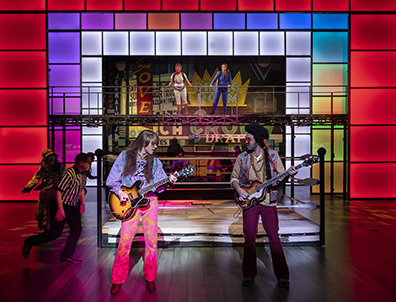
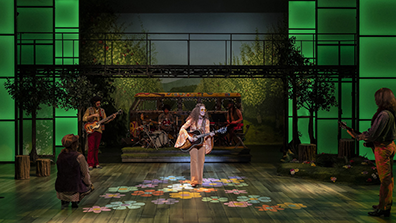
Top: Forest Lords Evan Rein on guitar (left) and Isaiah Terrell-Dobbs on bass play "Help!" as Celia (Naomi Ngebulana, top left) and Rosalind (Chelsea Rose) sing while the setting shifts from the wrestling arena to Arden Forest in the Bard on the Beach production of William Shakespeare's As You Like It at the Shakespeare Theatre Company's Harman Hall in Washington, D.C. Above, Dame Senior (Jennifer Lines, center) leads the Forest Lords through the last verse of "Help!" in the Forest of Arden: Rein on the right, Henry Beasley kneeling, Terrell-Dobbs back left. Photos by Teresa Castracane Photography.
The joke has been earning laughs since 1599. So why change it now? Jaques in William Shakespeare’s As You Like It offers song lyrics to his fellow exiled lords in the Forest of Arden. Here it is: “If it do come to pass that any man turn ass, leaving his wealth and ease a stubborn will to please, ducdame, ducdame, ducdame!” That “ducdame,” Jaques says, is a Greek invocation to draw fools into a circle which, presumably, the lords have formed.
Andrew Cownden’s version of Jaques, however, comes to us from about 1967. His joke begins with “I am he as you are he and you are we and we are altogether” and ends with “goo-goo, goo-joob.” That “goo-goo, goo-joob” is the Greek invocation to call fools into a circle; it works as well as “ducdame” has all these centuries. The difference is that the audience's laughter starts long before the goo-goo, goo-joob punchline because Cownden is not reciting Shakespeare; he’s speaking John Lennon.
I wondered how this production of As You Like It might work in “I Am the Walrus.” Perfectly, it turns out. That Beatle song is suitable for the moment, for the use of nonsense verbiage, and for the character of Jaques, whom Cownden plays as an Andy Warhol-channeling beat poet with a shock of blond hair and wearing a black sweater, bell bottom, brown-patterned pants, and a medallion.
This Shakespeare-Beatles mashup, concocted, adapted, and directed by Daryl Cloran for Bard on the Beach in Vancouver, British Columbia, is taking its second North American tour. It’s currently occupying the Shakespeare Theatre Company’s thrust-stage-configured Harman Hall in Washington, D.C., where its run has been extended twice.
Blasphemous, some might call what Cloran has done. Brilliant, I say. Though it is not totally textually Shakespeare’s As You Like It, it is enriched Shakespeare metaphorically in the way it combines the Fab Four of Liverpool’s compositions with the Swan of Avon’s text. Nor is this an academic appreciation of two great artistic forces blended into one. It is a two-hour, 40-minute (including preshow) laugh-in with great singing, dancing, and wrestling, too. Not often you get an Orlando (Jeff Irving) whose talents combine Shakespeare, Paul McCartney, Gene Kelly, Ann Margaret, and Cactus Jack in one performance.
Bard on the Beach first mounted this production in 2018, breaking box office records for the 33-year-old company occupying tents on Vancouver’s waterfront. The production toured North America with the Chicago Shakespeare Theater further developing it for the U.S. premiere in 2021. Bard on the Beach remounted the production this past summer and sent it on a second North American tour with a combined cast of Bard on the Beach and Chicago Shakespeare Theater actors.
Shakespeare's plot hasn’t changed. Orlando de Boys, disenfranchised by his oldest brother, Oliver, seeks his fortune by taking on Charles, wrestler for Dame Frances (Shakespeare's two brother Dukes have been re-gendered as sisters). Dame Frances had usurped and banished her sister, Dame Senior, and Orlando’s father was close to the banished dame. Though Orlando defeats Charles, upon learning Orlando’s parentage, Dame Frances denies him the briefcase of cash and the wrestling title belt. Watching the wrestling is dame Frances’s daughter, Celia, and her cousin, Rosalind, daughter of the banished Dame Senior. Rosalind and Orlando fall instantly in love. When Dame Frances banishes her niece, Rosalind disguises herself as a man with the name Ganymede, and Celia accompanies her disguised “in poor and mean attire” naming herself Aliena. They head for the Forest of Arden where Rosalind’s exiled mother lives with a band of exiled lords, including Jaques. Orlando, escaping the murderous intents of his brother, flees with his old servant, Adam, and they end up in Arden, too. Rosalind is still disguised as Ganymede when she encounters Orlando there and proposes curing his lovesick ways by pretending to be “his Rosalind” and behaving like, well, Rosalind. He agrees to the game. This silly love play includes three other couples: the court fool, Touchstone, with a goatherder, Audrey; an overly devoted shepherd, Silvius, pursuing a scornful shepherdess, Phoebe; and Celia matching up with Oliver thanks to a lion. In the end, Rosalind in her mystical way makes all right.
What do the Beatles bring to Shakespeare’s play beyond great songs and the 1960s setting, with the court centered on a wrestling arena owned by Oliver, and Arden Forest serving as a hippy commune? What the Beatles bring out in Shakespeare’s play is the point here.
The Beatle songs, played by an on-stage band—collectively identified as Lords, though most members play other characters, too—and sung by the cast, are much more than incidental music. They are woven into the plot and, more importantly, Shakespeare’s metaphorical constructions. “The songs we’ve chosen lend themselves perfectly to the Shakespearean text,” Cloran says in a Bard on the Beach press release for this past season’s staging. “The evolution of The Beatles through the ’60s is reminiscent of the free-spirited journey of the play’s main characters and the social and cultural evolution of Vancouver during that time.”
For example, “I Am the Walrus” displaces Shakespeare’s lines with Lennon’s but keeps the joke while staying true to the character delivering it. The two songs that kicked off Beatlemania kick off As You Like It’s love plot: “She Loves You” during the wrestling match, inspiring Orlando to overcome Charles; and “I Want to Hold Your Hand,” which furthers the joke of Orlando losing his ability to speak when Rosalind (Chelsea Rose) comes on to him. Other examples require only the song title to explain their textual connections: “Fool On the Hill” after Jaques meets the motley fool and desires a motley coat (certainly fashionable in his time); “You’ve Got To Hide Your Love Away” as Rosalind disguised as Ganymede pretends to be Rosalind in Orlando’s company; and “Do You Want to Know a Secret,” as Orlando hangs his verses to Rosalind on the forest trees—or, rather, Orlando is hanging “love-songs” (so called in Shakespeare’s text), and thus are Beatle lyrics, too. The verse Rosalind reads leads into “Eight Days a Week,” and Celia (Naomi Ngebulana), instead of “Why should this a desert be, for it is unpeopled? No!…” recites, “I feel good, in a special way. I’m in love and it’s a sunny day. Good day sunshine, good day sunshine, good day…”—she comes to the end of the page, flips it over and reads—“…sunshine.” She’s puzzled but will keep it for later use.
[For descriptions of how the 23 Beatles songs are woven into Shakespeare’s text, click here.]
Cloran’s handling of the Beatles’ evolution through the 1960s is more subtle. The band members wear referee-striped shirts in the opening scenes, fitting for the wrestling ring setting that serves the court of Dame Frances (Jennifer Lines). Those shirts also are reminiscent of early 1960s pop stars, like the Beach Boys. The band announces the shift from court to commune by ripping into “Help!” a song that marked the Beatles transition from carefree innocence to drug-induced self-awareness. Rushing on stage are Isaiah Terrell-Dobbs looking like Jimi Hendrix—except that he’s playing bass guitar—and Evan Rein playing Amiens playing lead guitar and, with long blond hair and playing solos on his knees with his back bent to the stage, resembling Mark Farner, lead singer and guitarist for Grand Funk Railroad. As they rock, the wrestling ring is dismantled, the backdrop switches to trees, and Dame Senior (Lines) drives a brightly painted VW love bus onto the stage. The Beatles songbook for the play also shiftsfrom the tightly structured songs, lyrically and rhythmically, of their early years to a prevalence of the freeform, psychedelic, and heavy metal work of their later years.
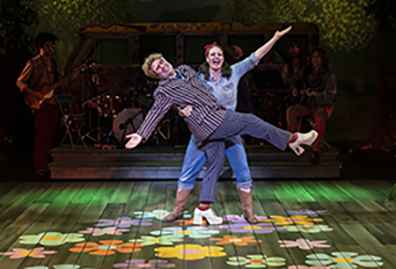
Touchstone (Kayvon Khoshkam) and Audrey (Emma Slipp) sing the Beatles song "When I'm 64" in Bard on the Beach's production of William Shakespeare's As You Like It at the Shakespeare Theatre Company's Harman Hall in Washington, D.C. Photo by Teresa Castracane Photography
All this plays out on a stage with production values approaching perfection. Scenic Designer Pam Johnson sets the wrestling arena against a backdrop of neon signs, then shifts to the forest with tree stumps (one serving as a martini cooler for Touchstone) and glades. The backdrop is framed in pastel panels that recall the variety and game shows that dominated TV schedules in the mid to late ’60s. Lighting designer Gerald King bathes the set in suitable environmental lighting, from the brightly lit wrestling arena to a forest at dusk, and shines psychedelic patterns on the stage itself. With a live band, its members roaming about the stage, and actors singing and hoofing simultaneously, sound designer Alistair Wallace achieves a good mix for most of the house, but not so well for the four rows of bleacher seating on either side of the thrust stage.
The more important scenery is that of costume designer Carmen Alatorre. She covers the most eclectic fashion decade in history with accuracy (never going over the top) and close attention to details on a canvas that also includes hillbilly farmers and professional wrestlers. Touchstone (Kavon Koshkam) bears glittering red lightning bolts on the heels of his platform shoes, and Dame Senior walks the forest in multicolored striped sandals. Rosalind wears a knee-length skirt and early ’60s bouffant in the court; as Ganymede she’s in a sky-blue suit, red-checked vest, pink shirt, blue striped tie, and ’64 Beatles’ style haircut. Brothers Orlando and Oliver (after his conversion; earlier he's in a formal suit) wear the same style polo shirt but different colors: Orlando’s is red with black and white stripes, Oliver’s is blue with orange and white stripes; and when their middle brother, Jacques de Boys (Henry Beasley) shows up in the final scene, his tan shirt has black and orange half stripes.
The audience’s near nonstop laughtrack is sustained by contextual, textual, and off-text jokes, a standard established in the 20-minute “Superstar Wrestling” preshow (note: that's 20 minutes before the play's announced start time). Charles (Marco Walker-Ng) wrestles three opponents in two matches with Oliver de Boys coaching him, Dame Frances presiding, Le Beau (Cownden) refereeing and getting trash-canned into unconsciousness, and Touchstone as the ring announcer. Accompanying the wrestlers are valets Eleanor Rigby (Alexandra Lainfiesta, who goes on to play Phoebe) and Lady Danger (Emma Slipp, who goes on to play Audrey). They get into a catfight, of course—pro wrestling valets always did; notably, Phoebe and Audrey hug when they see each other in the play’s final scene. Rigby switches from being valet for Mustachio (Matthew Ip Shaw) to Charles because, she sings, “Money (That’s What I Want),” pointing to the cash-stuffed briefcase hanging over the ring. In the play proper, as Orlando prepares to wrestle, Charles is doing bicep curls with a perfectly straight Rigby as his barbelle.
This preshow is also a thematic primer. “Sport” is a metaphorical arc in the plays opening between Cecilia and Rosalind, who pretend to wrestle as they sing “We Can Work It Out.” The play opens with Orlando, who works for his brother, sweeping the floor alongside old Adam (Norman Moses). Orlando is singing to himself, “I don't care too much for money, money can’t buy me love,” establishing a Beatle-enhanced metaphor imbedded deep in Shakespeare’s play. Adam mentions that he lost his teeth in Oliver’s service, and as he requests to accompany Orlando to Arden, he notes that, though he is almost four score, “yet I am strong and lusty.” Both lines suggest he may be a former pro wrestler. Moses, who also plays Sir Martext as a hippy stoner priest, turns in such a superb performance as Adam he gets an exit applause as he and Orlando head off to Arden.
Touchstone is not a traditional courtly fool, despite Jaques’s report, but Khoshkam is a comic genius, starting with the preshow. His absurd play-by-play to the over-the-top wrestling includes listing such sponsors as Norwegian Wood Roofing; Glass Onion Window Repair; Asbestos, “breathe easier”; and CVS, “does anybody work here?” (his sponsors differed in the three performances I attended). During the play, he delivers many a non-textual aside to the audience, including cynically observing that nobody helps him with the luggage. As Rosalind approaches in one scene, Touchstone tells Corin (Jennifer Copping, re-gendering the role) they need to hide. “Why?” she asks. “Because it’s Shakespeare,” he says. This running joke leads to the trees at one side of the stage becoming identified as “the Shakespeare place.” The most bizarre departure from the text comes after Touchstone goes all “Helter Skelter” on William (Beasley), his rival for the love of Audrey. His testosterone bolstered, Touchstone growls seductively at Audrey. She responds with a mooo. At first taken aback, Touchstone counters with a chicken clucking. She baahs. He mimics an elephant trumpeting, arm raising from his nose. She oinks. He presents a velociraptor screech, his claws raised.
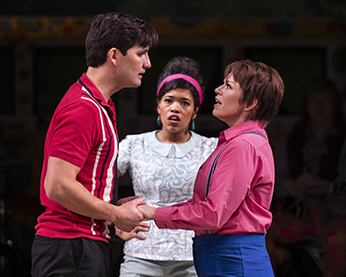
Orlando (Jeff Irving) promises to love Rosalind (Chelsea Rose, disguised as Ganymede) "forever and a day" as Celia (Naomi Ngebulana) presides over their faux wedding in the Bard on the Beach's production of William Shakespeare's As You Like It at the Shakespeare Theatre Company's Harman Hall in Washington, D.C. Photo by Teresa Castracane Photography.
Touchstone also kicks off the most electrifying visual of the play. As Charles is walloping the hapless Orlando in the ring, four things happen simultaneously: Rosalind places herself in Orlando’s sightline, Touchstone jumps up on the ropes as he starts singing “She loves you, yeah, yeah, yeah,” and the wrestling slips into slow motion. After this slo-mo, slow-soul start to the song, the music slips into its Beatle pace and the action in the ring returns to mayhem. Two more slow-motion moments come (but the music maintains its beat) as Orlando turns the tide of the match. Slow-motion gags have become clichéd in Shakespeare theater these days, but this sequence is well-honed and hilarious as well as set to an infectious Beatles hit.
The production has slapstick aplenty, especially with Silvius. Literally. As something about Ganymede moves Phoebe to sing “Something,” she moves about the stage and somehow hits, kicks, knocks down, lies on, steps on, and doubles over Sylvius. She also plays a mean air guitar as her hair whips Sylvia’s face behind her. Her manic behavior is reinforced by Lainfiesta delivering Phoebe’s assessment of Ganymede by heeding the speech’s irregular stops-and-starts.
Working in 23 Beatle songs plus reprises means much textual cutting, and some are noticeable: a couple of scenes and extended jokes are completely excised, but most of the cuts are internal snippets. When a character lists things, the list is trimmed to just two items, such as Orlando’s laments before he wrestles Charles and Touchstone’s comparisons between court and countryside. Celia gets only one chance to dramatically describe for Rosalind her seeing Orlando in the forest before the scene leaps ahead to Orlando arriving on the stage with Jaques. Some afficionados will miss some of these lops—to me, cutting short the fake wedding scene between Orlando and Ganymede was jarring—but you can’t have your yellow matter custard and eat it, too. In another structural change to the text, Cloran pushes back the first Arden scene until after Orlando and Adam leave the wrestling arena and head for the woods. This gives the play a clean break from Dame Frances’ court to Dame Senior’s commune.
A couple of checklists survive intact. Silvius keeps all three of his iterations of what ‘tis to love, delivering the last with such heartfelt sincerity he makes Phoebe briefly rethink her disdain for him and enamors the audience and Rosalind, too:
It is to be all made of fantasy,
All made of passion, and all made of wishes,
All adoration, duty, and observance,
All humbleness, all patience and impatience,
All purity, all trial, all observance;
And so am I for Phoebe.
McCartney can only dream of writing anything approaching that.
The other untouched checklist is Jaques’s seven ages of man. Cowndon is a standout Jaques among the many I’ve seen because of his approach to the character and how effectively he lands his jokes. That approach is informed by his ’60s counter-culture poet philosopher persona. He seems to make up “Seven Ages” on the spot, and every stage sears with cynicism, except the last when his own fear of growing into oblivion haunts him. Despite his melancholia and penchant for insulting, this Jaques has a heart of gold; Dame Senior apparently has a crush on him. Facing the pen knife-wielding Orlando and his threat that "He dies that touches any of this fruit," Cownden’s Jaques picks up a red bell pepper from the table as he answers, “An you will not be answered with reason, I must die.” This earns a laugh from the audience, but Jaques is not being flippant. Instead, he slowly approaches Orlando, who demands “I almost die for food—and let me have it,” whereupon Jaques tosses the bell pepper to Orlando and follows with a “you’re welcome” shrug. Jaques also is the first to assist the frail and fainting Adam to a seat. At plays end, Jaques offers sincere benedictions to Dame Senior and the four couples. More often I've seen Jaques cynical in his final words but sincere in the ages of man speech: Cownden's cynicism in "Seven Ages" and sincerity in his departing words has it right.
This production is full of discoveries beyond those that emerge through the music. Some of these are “duh!” moments I’ve never noted in more than two dozen stagings I’ve seen and countless times reading the play. Upon Rosalind as Ganymede meeting Orlando in Arden, Orlando busies himself with his love songs while Rosalind’s Ganymede compares a clock to the sighs and groans of a lover in the forest. This causes Orlando to look up, and shock crosses his face upon seeing the “pretty youth.” He immediately approaches Ganymede to ask if he’s “native of this place.” To achieve this moment means cutting all of Ganymede’s schtick about time, but that’s fine, for this staging perfectly pairs with Orlando’s telling Dame Senior at play’s end how "the first time that I ever saw him methought he was a brother to your daughter.”
With Irving and Rose, the psychological dynamics of this scene are in full view. Rosalind sniffs Orlando as she paces around him. When he puts his arm around her, she has trouble keeping her composure. Orlando takes on a manly pose when Rosalind mentions the outward signs of a lover, but he’s not expecting her to describe a veritable wuss. Accepting Rosalind’s challenge to court her Ganymede as Rosalind, Orlando says, “With all my heart, good youth.” “Nay,” she replies, "you must call me Rosalind.” Irving’s Orlando holds up Rose’s chin, looks her in the eyes, and says in a smoldering voice, “Rosalind.” Rosalind and a couple hundred women in the house and some guys, too, lose it.
They share another nice moment when Orlando, sour for his brother finding love and his own love unrequited, ends his courtship game with Ganymede. “I can live no longer by thinking,” he says, taking off the necklace Rosalind gave him after his wrestling win. He puts it on a stump, and Rosalind, alarmed, runs across to pick it up. “Know of me then,” she says, giving it back to him, and announcing that she will bring about the seeming miracle that is the play’s final scene.
This production has another “duh!” in that final scene I’ve never noticed before: Oliver has no idea that the Aliena he fell in love with is Celia until she and Rosalind return to the stage as their real selves. Maybe the traffic is too crowded in that scene for me to have noticed, but in this production, MacDonald-Bain making it so noteworthy plays to the play's subtle theme that money can't buy you love. Their first meeting is appropriately cute, Oliver bearing the napkin with Orlando’s blood from fighting a mountain lion (Arden is clearly a North American forest in this production). When the evil-reputed Oliver describes his conversion after Orlando saved his life, Ngebulana's Celia inserts an “awwwww,” which gets a certain laugh. This, though, is Celia's true self in the way her heart is her foundation for truth: she seems naive, to her mother when she stood by Rosalind, to Rosalind, too, and now to us, the audience. MacDonald-Bain’s reaction upon seeing that Aliena is actually Celia reiterates how authentic his conversion has been, given he already has turned his own inheritance over to Orlando to be with a woman he thought was a poor shepherdess.
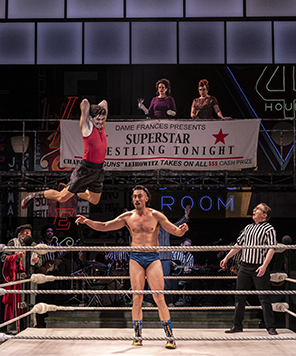
Orlando (Jeff Irving) takes out Charles (Marco Walker-NG, center) with a diving overhead chop in the Bard on the Beach's production of Shakespeare's As You Like It at the Shakespeare Theatre Company's Harman Hall in Washington, D.C. Watching are Adam (Norman Moses) in the corner, the referree Le Beau (Andrew Cowndon), Dame Frances (Jennifer Line), and her assistant (Jennifer Copping), top. Photo by Teresa Castracane Photography.
Then, too, Ngebulana discovers many nuances in her Celia, from the way she uses her overture to Orlando after the wrestling as advocate for Rosalind in romance to her more dangerous advocacy when her mother banishes her cousin. In this staging, Dame Frances overhears her daughter and Rosalind talk glowingly about Orlando, and how Celia will still like him though her mother considered his father her enemy. This is what prompts Rosalind's banishment. When Celia objects, Dame Francis lectures her, citing solid albeit harsh political principles, and calls Celia a fool. Celia's subsequent “Pronounce that sentence then on me my liege: I cannot live out of her company” is not a tween’s lament but a warning her mother doesn’t heed. “You are a fool,” Dame Frances says instead. Rosalind’s reaction to Celia indicates she might agree; it takes a while for Rosalind to grasp what Celia really means when she claims that she’s been banished, too.
Jennifer Lines is a hard-hearted woman as Dame Frances, but she’s all sweetness and smiles as Dame Senior, though killer instincts still sneak into her peace-and-love persona. She preaches to the exiled lords, who are dubious about Arden being a better existence than the court, that their lives are now “exempt from public haunt” where they can find “tongues in trees, books in the running brooks, sermons in stones, and good in everything.” Amiens commends how Dame Senior “can translate the stubbornness of fortune into so quiet and so sweet a style.” Lines smiles at the compliment then says with much gusto, “Come, shall we go and kill us venison?” to which the lords shout “Yeah!” Once a dame, always a dame no matter how flowery powery you dress and speak.
In addition to great aesthetics and great Shakespeare, the show has great singing. Ngebulana brings a soul singer’s depth to her performances. Rose harmonizes like a true Beatle no matter who she’s duetting with. Cownden employs a rich tonal quality in his voice to turn “The Fool on the Hill” into a bittersweet yet triumphant lament, and he rocks "I Am the Walrus." Beasley who, in addition to playing William and the middle de Boys brother, also plays guitar with the band, a preshow wrestler paired with fellow guitarist Rein, and Forest Lord #1. His big spotlight comes as that ubiquitous Forest Lord singing “Let It Be” in its entirety. His poignant phrasing wins deserved hoots and hollers from the audience.
The show has great dancing, including Rose and Irving do a Fred Astaire-Ginger Rogers bit with “Can’t Buy Me Love.” That is Irving’s third multi-art-form physical challenge in the production. He sings “Do You Want to Know a Secret” while romping around the stage, leaping on and off tree stumps, in a dance that combines Gene Kelly athleticism with Ann Margaret flirtation. His night starts as a wrestler, coming back from certain defeat to take out Charles with a diving overhead chop.
With its five-year, coast-to-coast, across the continent success, this As You Like It could be a hit on Broadway and tour globally. If you love Shakespeare, you'll love this and get some great Beatles music, too. If you love the Beatles, you'll love this and get some laugh-a-minute Shakespeare, too. If you just want a groovy good time, here you go. On the whole, this Shakespeare + Beatles invocation works. Goo-goo, goo-joob.
Eric Minton
December 24, 2023
Comment: e-mail [email protected]
Start a discussion in the Bardroom



 Find additional Shakespeareances
Find additional Shakespeareances